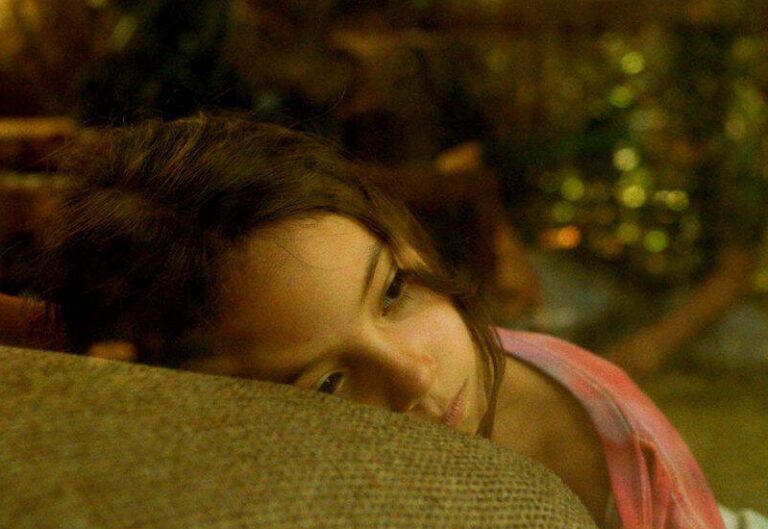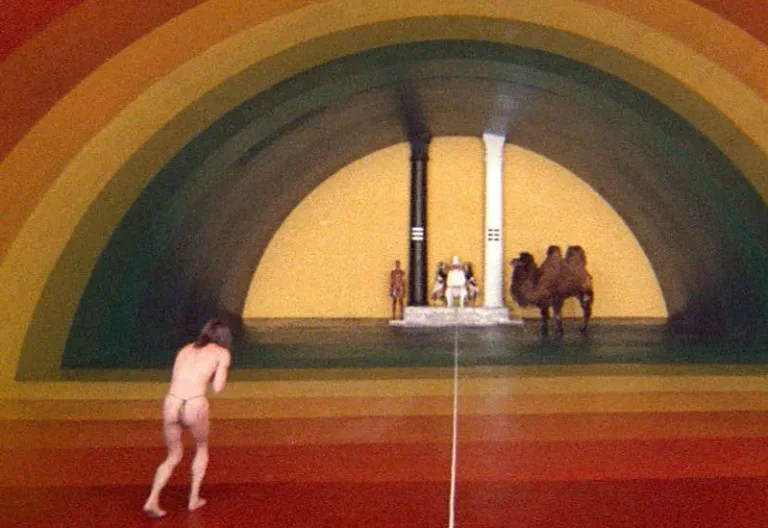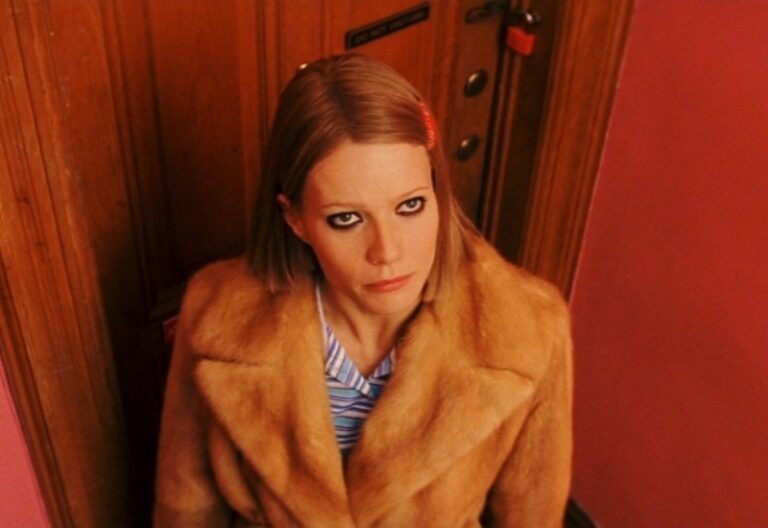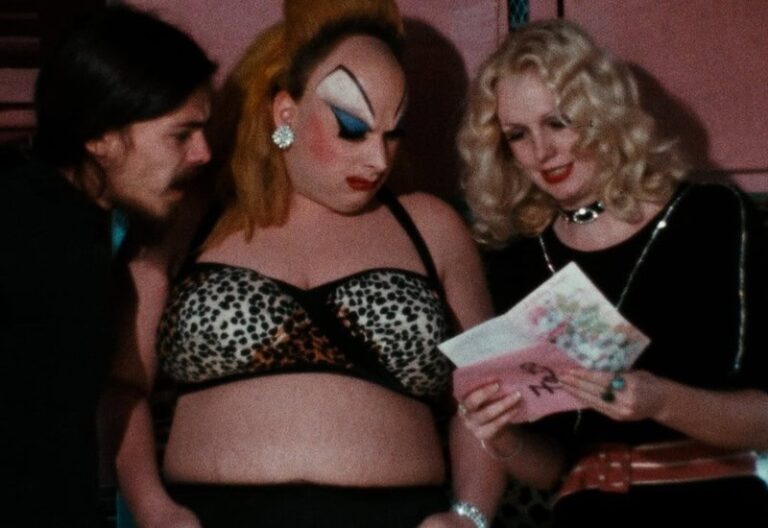ghost world review
film by Terry Zwigoff (2001)
Daniel Clowes and Terry Zwigoff’s creative works have inadvertently found their way into my social spheres time and time again, whether through friends attending art school, being around performance artists, or my involvement in punk rock, underground music, and various subcultures. Whatever the context, their presence penetrated the borders on all fronts, and their works have always sincerely reflected a point of view that is predominantly shared with strictly underground and subversive filmmaking, not studio films.
Review by: Aaron Jones | Filed Under: Film Reviews
Jul 15, 2024
My own social circles and working at a record store for most of the 2000s put me in direct contact with people like Seymour and Enid daily, both in terms of friends and coworkers, as well as customers. I believe my life is better for it, and part of me still wonders if the film’s creators based Seymour on one of my coworkers back at the record store because the resemblance is uncanny. Their enriching characters never felt borrowed from a Sears catalog of clichés that often populate studio films; instead, they feel authentic and lived in. Now, over 20 years after the debut of Ghost World, some of the edges show tarnish, and it creaks in areas, but overall, it stands the test of time.
We are immediately introduced to Enid (Thora Birch) and Rebecca (Scarlett Johansson), two inseparable, pessimistic teenagers begrudgingly attending their high school graduation. As they face adulthood, their plans of getting jobs and an apartment together are thwarted by a shift in their relationship, and they begin to drift apart. Caught between adolescence and adulthood, Enid begins pursuing any distraction from becoming responsible, while Rebecca focuses on her job to gain more independence, widening the gap from her own adolescence.
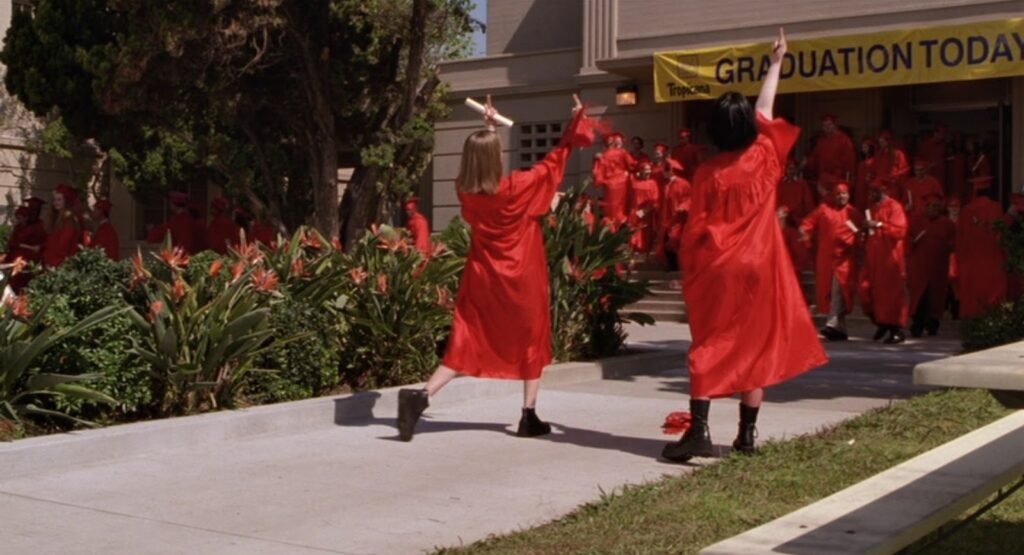
It quickly establishes the film’s unusual and distinct tone through its entrenched sense of irony while observing and lampooning the absurdity and static banality of urban existence. Through its early scenes, we see the depths of Enid and Rebecca’s cynical point of view towards the world as they maneuver within it, displaying their openly contemptuous attitude toward anyone or anything adhering to dominant mainstream culture. Openly displaying their vapid lack of interest in contributing to society, their jaded personalities firmly assess their rejection of conventionality and repulsion to the shallow celebration of mediocrity and falsehoods. A friendship overflowing with a shared irreverent sarcasm discloses the strength of their bond, slowly beginning to show the emerging rift between them.
Though it begins as a female coming-of-age story revolving around the platonic relationship between two teenagers, it veers away from that friendship and begins to focus mainly on Enid and her newly evolving relationship with Seymour. Seymour, who Enid and Rebecca meet via a practical joke, is an eccentric relic who Enid initially believes is just another down-on-his-luck loser.
However, her opinion changes as she begins to value Seymour as more than just a novelty, recognizing his sincerity through shared experiences and outsiderness. The friendship symbolically highlights the mirrored parallels between Enid and Seymour, two loners whose eccentricities find no sense of belonging in their contemporary urban trappings yet cannot find comfort in the shallow lie of phony and toxic happiness. Reshaping both characters, we begin to see them with new eyes through their idiosyncrasies and flaws, finding much deeper vulnerabilities than previously understood.
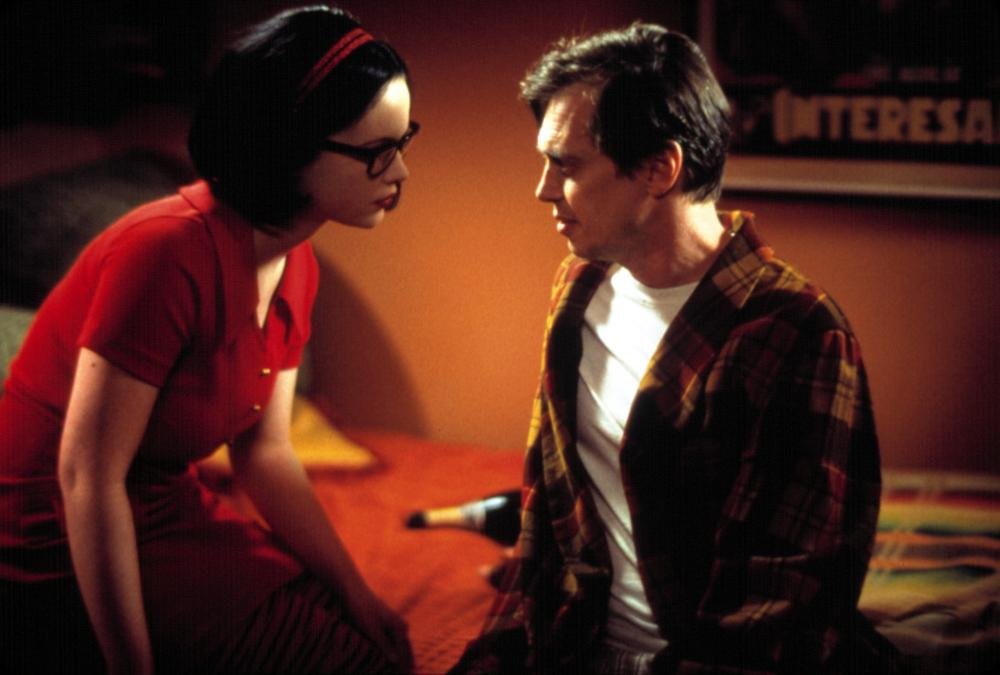
Expanding the world of the film beyond the compact relationships of Enid’s inner circle, the film shares with the audience Enid’s artistic interests and introduces us to another wonderful character in the film, the perfectly cast art teacher Roberta Allsworth (Illeana Douglas). She offers another example of its strength in crafting characters. Though a small role, her presence is impactful, and though clearly a stereotype, she is not dismissed as a lackadaisical attempt at world-building to fill out the population of the film.
In fact, in some ways, she can be seen as a shadow of some of the other characters, all attempting desperately to communicate something that cannot be communicated through the shallowness society forces us into. An artist in true form, she also plays the role of nurturer, recognizing Enid’s attempt to communicate with others on a deeper level, something clearly missing from Enid’s other relationships.
At the same time, Roberta represents or stands in as a deflating example of pandering and hypocrisy within the art community and a reminder of how uniquely different our perspectives can be, even within fringe communities. It reveals some connecting threads behind the creative minds behind this film, both filmmaker and comic creator Daniel Clowes, that undoubtedly suggests an art school background that I immediately recognized and elicited flashbacks of my visiting many friends who attended CalArts and other art schools in my teenage years. For those curious to see more realized visions of the life of artists through the lens of Zwigoff, Crumb (1994) and Art School Confidential (2006) may help scratch that itch.
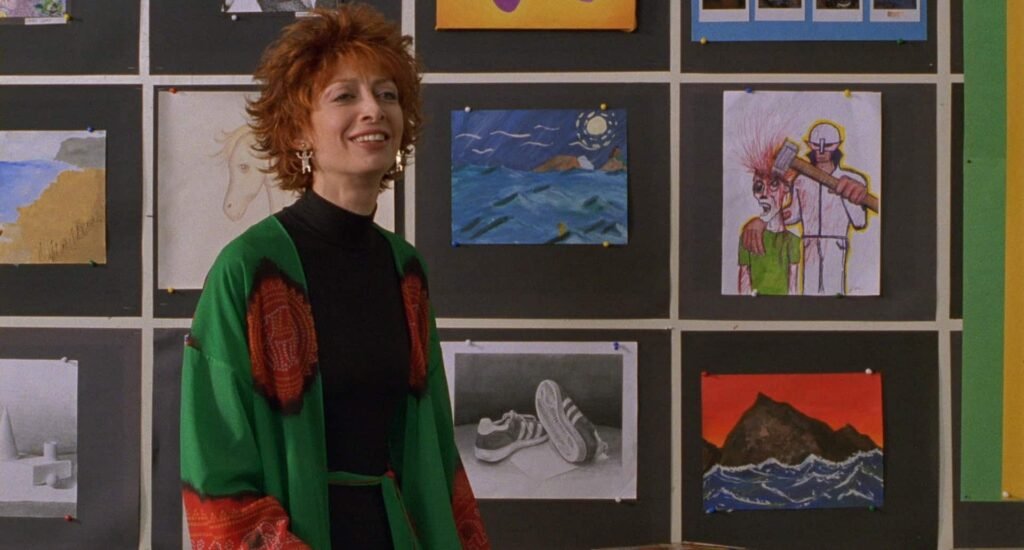
The film doesn’t depend on a point-by-point narrative rhythm. Instead, it structures itself through a series of fractured moments, much like the comics it has spawned; it is held together through the strength of the characters and precise world-building observed through the perceptions of teenage angst.
It manages to find a tight-knit balance between humor and drama without relying too much on slapstick; it still sheds light on absurdity and satire but with bone-dry revile. It stays mostly relevant today, succeeding where it has always held its strength in its authenticity through its characters. Zwigoff shows his ability and fondness to build up our favor for his protagonists and then peel away the layers showing their flaws much like he does in Art School Confidential.
Possibly, these may not be the most likable characters, but that’s not the point. It is a film about human flaws and attempts to bring awareness to a different point of view outside what is commonly represented in media, along with our fallibilities and charm, while showing us the imperfections of human behavior. At the time, these were often underrepresented voices and points of view, unlike the landscape of social media and the internet today, which are largely occupied by voices of nonconformity and dissent. But at the time of its release, cinematic efforts like Ghost World found their audience through slow momentum and word of mouth that opened young, impressionable minds to alternatives that were otherwise left ignored, while inspiring those searching to find an otherwise unknown outlet.
As a film so intrinsically indebted to the past, one of its thematic messages may be interpreted as a juxtaposition of itself; from Seymour’s love of the early 20th century to Enid’s fondness for 1960s Indian Bollywood music, Ghost World’s influences are commonly tied to a past no longer acknowledged or recognized outside eclectic subcultures and fanatical interests. It is with such a large canvas of interests that some of these visionaries and creators get their roots, but in a way, I also see Ghost World as a playful cautionary tale. Like Seymour says to Enid, “You can’t connect with other people, so you fill your life with stuff,” and “I don’t want to meet someone who shares my interests. I hate my interests.”
Eventually, Enid finds herself at the same bus stop where the curious old man, who seems stuck in limbo, waits throughout the film. Enid takes control of her life and sets out on her own path, not letting her otherness and sense of alienation become the bane of her existence but rather her inspiration to both find and choose for herself. She represents someone who could have just as easily taken the old man’s place as someone unable to move on from her adolescence, like so many of those who live in a past from which they are unwilling to divorce themselves, inadvertently succumbing to a life of solitary alienation with only material objects of the past to which they can connect, a very strong and disturbing theme coincidentally shared in Zwigoff’s documentary Crumb.
Ghost World is a superb story of teenage angst searching for identity and authenticity in an over-commercialized world of corporate allegiances and homogeneously disingenuous mediocrity.

Author
Reviewed by Aaron Jones. Based in California, he developed a passion for film from a young age and has since viewed over 10,000 films. His appreciation for the medium led him to film criticism, where he now writes for CinemaWaves, offering analysis of both contemporary releases and timeless classics. In addition to his work here, he has contributed to other publications as well. Feel free to follow him on Instagram and Letterboxd.
In a bustling Mexican household, seven-year-old Sol is swept up in a whirlwind of preparations for the birthday party for her father, Tona, led by her mother, aunts…
The scandal of the 1973 Cannes Festival, director Jodorowsky’s flood of sacrilegious imagery and existential symbolism in The Holy Mountain is a spiritual quest for…
Envisioned on the picturesque coast of Southern California and based on the book of the same title, the collaborative efforts to put Midnight Cowboy on screen resulted…
American eccentric cinema is a distinctive style of filmmaking that surfaced in the late 20th and early 21st centuries, characterized by its quirky characters, whimsical…
Arthouse film refers to a category of cinema known for its artistic and experimental nature, usually produced outside the major film studio system. These films prioritize artistic…
A cult film is a movie that builds a devoted following without achieving mainstream success or widespread critical praise at the time of its release. These films are…

